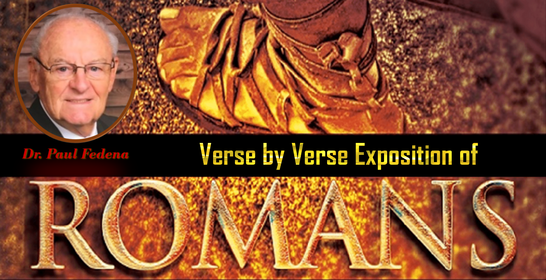BY
|
TEXT: Romans 1:2-4
THESIS: To introduce the Book of Romans & its human author, Paul, and its Divine message.
INTRO.:
A. “I must…see Rome…” When Paul made this declaration he wasn’t saying he wanted to see the sights: the Coliseum, the Roman Forum, the Senate, the Apian Way, or even the throne of the Caesar. Rome had built arterial highways with tentacles stretching across the world of Paul’s day – the Empire. And “if all roads lead TO Rome” as the byword said, then they all led FROM Rome. Thus Rome became the focus of this great missionary. His vision extended everywhere these Roman roads led. Rome then, was written boldly at the top of Paul’s itinerary.
B. Paul should have gotten to Rome himself, but due to his stubbornness stemming from his love for his brethren in the flesh, he had postponed the trip & placed his life & ministry in jeopardy. His sin of delayed obedience, even though driven by “godly ambition” cost him & the world dearly. Think of the influence this mighty powerhouse could have had organizing the church at the seat of Roman Government! It was not to be.
Acts 22:17-18 And it came to pass, that, when I was come again to Jerusalem, even while I prayed in the temple, I was in a trance; And saw him saying unto me, Make haste, and get thee quickly out of Jerusalem: for they will not receive thy testimony concerning me.
Acts 20:22-23
And now, behold, I go bound in the spirit unto Jerusalem, not knowing the things that shall befall me there: Save that the Holy Ghost witnesseth in every city, saying that bonds and afflictions abide me.
Acts 19:21
21 After these things were ended, Paul purposed in the spirit, when he had passed through Macedonia and Achaia, to go to Jerusalem, saying, After I have been there, I must also see Rome.
💥Paul had received visions, prophetic warnings & direct messages from God NOT to go to Jerusalem & instead to go to Rome, but Paul, motivated by love for his people hesitated. Finally he would arrive in Rome in chains & be imprisoned. Instead of becoming the brilliant director of the church in Rome, he was confined at the prime of his life & ministry. Think of what could have been accomplished or what could have been prevented (Catholicism!), if he had obeyed.
C. Paul decided instead to send a letter “BY SPECIAL DELIVERY.” 💥He had heard about a lady named Phoebe, an active member of a nearby church in Cenchrea who was going to the City of the Caesars. He could write the church there & send it with her. In the folds of her robes she carried the theological masterpiece and one of the most important documents in history – the epistle to the Romans. (This letter of Paul is always placed first in the N.T. canon of Script. & is the longest & most profound of Paul’s epistles).
TRANS.: The title “BY SPECIAL DELIVERY” however does not just refer to the mail-lady who carried this letter to Rome, but the manner in which Paul received this information: by Divine Revelation – from the mind of God to the heart of Paul the Apostle, to the Roman Christians & to us…
I. THE MAN: v.1a
A. His Modesty: (“…a servant”)
1. Paul is introducing himself to the Christians in Rome, many of whom were no doubt slaves.
ILLUS.: The word Paul uses is “doulos” or “bondslave.” There were about 6 million slaves in the Roman empire so Paul’s use of this term would have personal meaning to those in bondage. But his surrender was to the Savior, whom he served willingly. So Paul became a loving slave like those in O.T. times who, when set free, chose instead to stay with their masters even willingly taking an external badge of slave I.D., i.e., a wooden plug in their earlobe. Paul was not ashamed to be identified as a bondslave of Jesus Christ.
a. Some of the believers in Rome were his converts, but most did not know him (though they may have known of him).
b. The Emperor Claudius had expelled all Jews from Rome in A.D. 49-50 but that decree was lightened by the time of the writing of this letter in A.D. 56-60, so there were both Jews & Gentiles in the church there and both would have understood his identification as a slave.
2. Servanthood always precedes service, so Paul speaks of himself humbly as one whose desire is first & foremost to be a servant.
B. His Majesty: (“…an apostle”)
1. A servant belongs to another…an apostle is sent by another.
2. He is a commissioned ambassador.
3. Paul was establishing a bond with the believers in Rome by his use of the term “servant” but he also needs to establish his credentials to instruct them in sound doctrine; the purpose of this epistle.
ILLUS.: One minute he was an enemy of Christ, the next he becomes a general in His army. 💢Paul is the Apostle to the Gentiles, thus 💢Peter ministers primarily to the Jews. There is no mention of Peter in this epistle to the Romans! Strange indeed if he was the first Roman Pope! How dare Paul slight him in this epistle? When he closes the letter, Paul sends salutations to a long list of people, by name; some 27 in all, along with those associated with them referred to collectively. Peter is omitted!?
a. There are many servants who are not Apostles.
b. There are no Apostles who are not servants.
QUOTE: Martin Luther: “The greatest (danger) is to enter the ministry without a Divine call. If even those who are not safe in it whom God has called, as Judas, Saul and David – …woe to those pitiable persons (who take upon themselves [the ministry] without a Divine call.)”
II. THE MESSAGE:
A. The Grand Old Gospel: v.1b
1. Paul says he was “separated unto the Gospel.”
ILLUS.: The word “separated” means “set off by a boundary” – i.e., Paul’s life was determined by the bounds of the Gospel message he preached; it severed him from distractions, if kept him focused & proscribed his lifestyle.
✝Soon after the Spanish adventurers of Cortez landed on the shores of Mexico their captain ordered their boats to be burned on the beach. From then on it was victory or death. Paul cut himself adrift from all possibility of compromise so far as Christ and the Gospel were concerned.
B. The Glorious Omnipotent God: v.2-4
1. The revealed One: “promised afore…”
a. This statement reveals Paul’s forte as a Pharisee, i.e., expounding the O.T. truths in light of N.T. doctrine.
b. It also speaks of his calling.
Galatians 1:15-16 But when it pleased God, who separated me from my mother's womb, and called me by his grace, To reveal his Son in me, that I might preach him among the heathen; immediately I conferred not with flesh and blood:
c. “The prophets” connected the O.T. & N.T. – Paul points to Christ as being the focus of their message.
2. The incarnated One: “…according to the flesh”
ILLUS.: Even though Jesus had a natural birth & a fleshly body, even His conception was super-natural. The Holy Ghost implanted a seed in Mary’s womb creating “that holy thing” inside her. There was no genetic connection to human parents. Neither the first Adam nor the second Adam were conceived by human beings. “A body hast Thou prepared Me…”😇
3. The declared One: “declared to be the Son of God…by the resurrection”
CONCL.: This then is the man and his message to be given in inspired detail in the great epistle of Romans. It not only took an inspired man to pen this epistle, but also a saved, dedicated, educated man to forcefully present the arguments of this great letter. Great men of the ages have paid tribute to the author of Romans and to the contents of this book of the Bible. It was indeed a letter sent “BY SPECIAL DELIVERY” by God to humanity. As in these opening verses, the great doctrines of “the faith” will be expounded herein. Romans is the “systematic theology” book of the N.T. But it is not just dry doctrine, rather, an ingenious & logical presentation of Divine truth. To grasp its teachings is to understand the N.T.
💥Paul may not have directed the work of the churches in Rome, but he surely gave them and all other churches a firm foundation of eternal truth upon which to build.
| romans_1_a.pdf | |
| File Size: | 83 kb |
| File Type: | |






